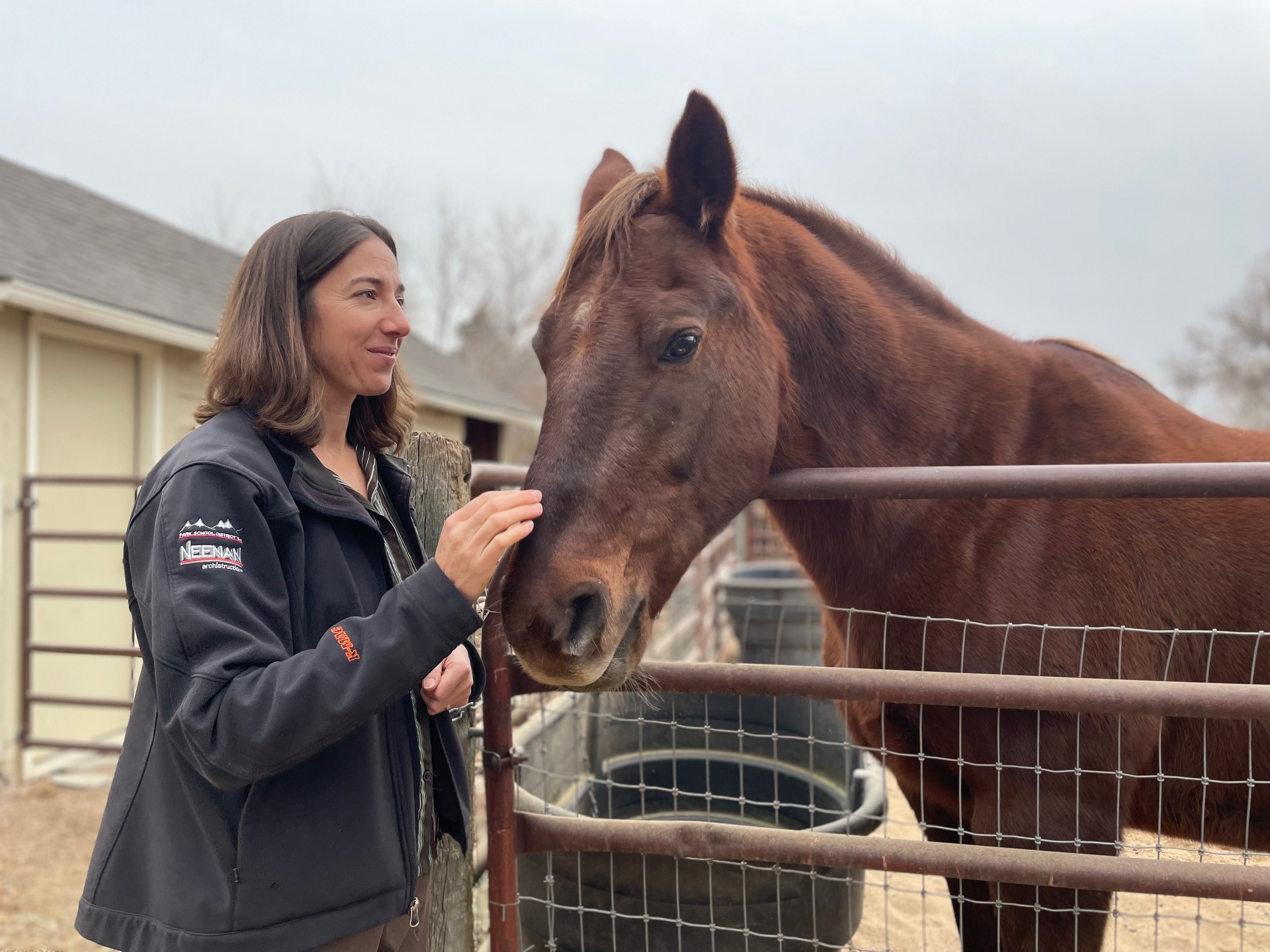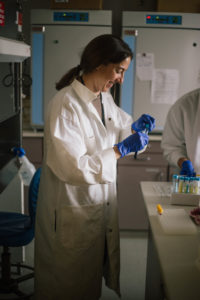
Angela Bosco-Lauth always wanted to become a veterinarian. When an outbreak of West Nile virus hit northern Colorado as she was beginning her undergraduate studies, the trajectory of her career completely changed.
“I am a horse owner so I was pretty worried about it,” said Bosco-Lauth, an assistant professor in the Department of Biomedical Sciences. It was then that she was introduced to Biomedical Sciences Professor Richard Bowen, who became her mentor throughout her education and with whom she now shares a lab space. “I was excited to see that his work would impact my horse’s life. I decided that instead of doing veterinary school, which I ended up doing later, I wanted to become a researcher so that I could help keep animals and people safe.”
Bosco-Lauth went on to earn both a Ph.D. in microbiology and a Doctor of Veterinary Medicine degree from Colorado State University before launching her career as a researcher, educator and clinician. She was awarded the 2021 Zoetis Award for Veterinary Research Excellence for her innovative work and will deliver the keynote address at the 23rd annual College of Veterinary Medicine and Biomedical Sciences Research Day event.
Pandemic pivoting
“Most of what I do is research into zoonotic infectious diseases,” Bosco-Lauth said. “And for the past year-and-a-half, that work has focused almost exclusively on SARS CoV-2.”
When COVID-19 first emerged, Bosco-Lauth and Bowen teamed up and immediately began looking at host susceptibility in different animals including cats and dogs. “Every time there is a new and emergent pathogen, we jump on it quickly because we have the ability to do some really unique animal modeling,” Bosco-Lauth said.
They quickly found cats to be highly susceptible and began discussing targeting vaccine efforts in domestic pets as well as continuing to understand the virus’s impacts on wildlife species. Their ongoing SARS-CoV-2 work includes human vaccine and therapeutic efforts, animal vaccines, and looking at host susceptibility and transmission.
“Every time we think we have it under a control, a new variant pops up so now we are continuing to work on understanding what this means for different animals and for people’s pets,” Bosco-Lauth said. “There are still a lot more questions than answers at this point.” This work has led to coverage in several national news organizations, including two New York Times articles.
Research Day 2022
In recognition of her 2021 Zoetis Award for Veterinary Research Excellence, Dr. Angela Bosco-Lauth will kick off the 23rd annual CVMBS Research Day with a keynote address on Saturday, Jan. 22 at the Lory Student Center.
Showcasing innovative research from across the College of Veterinary Medicine and Biomedical Sciences, Research Day provides students with a unique opportunity to gain experience presenting their work amongst a supportive peer group.
This year’s event features additional and expanded award categories to recognize more students and post-doctoral researchers at all levels as well as increased community engagement through Science on Tap.
A One Health approach
Bosco-Lauth is fueled by research that links human and animal health. Working to solve the complex health challenges that arise where human and animal environments overlap is a constant challenge in today’s world. Bosco-Lauth is especially passionate about mitigating harmful impacts to wildlife. “Wildlife conservation is one of the most important things to me,” she said. “The impact humans have on wildlife species is tremendous.”

Of the many research efforts Bosco-Lauth is currently working on, one she is most excited about is an interdisciplinary collaborative project called BROADN (Biology Integration Institutes: Regional OneHealth Aerobiome Discovery Network) that will look at how microbes in the air move and interact. “We are investigating if there is such a thing as an airborne microbiome and if so what it means for human, animal and ecological health,” she said.
Another of Bosco-Lauth’s passion projects is her ongoing involvement in community-based West Nile virus research, which involves looking for antibodies in backyard chicken eggs. “This was the most fun thing I did all summer, and it is neat to be able to circle back to this kind of community-based work since West Nile virus is the disease that got me into science in the first place,” she said.
Other projects underway in Bosco-Lauth’s lab include studying wildlife as a potential source of a tickborne virus called severe fever with thrombocytopenia syndrome, which emerged in the U.S. a few years ago and can cause severe disease in humans; developing a vaccine for rabbit hemorrhagic disease; looking at feral swine infectious disease surveillance and response to anthrax vaccination; and studying RNA virus surveillance in ticks and Usutu virus infection in birds.
In addition to conducting research, teaching veterinary courses and mentoring students, Bosco-Lauth also serves as the attending veterinarian for the Animal Reproduction and Biotechnology Laboratory and the Animal Disease Laboratory.
“Dr. Bosco-Lauth is a rising star and shows exceptional promise as a research scientist,” said the late Biomedical Sciences Professor and interim Department Chair Bob Handa in her Zoetis award nomination letter. “In addition to her research prowess, she’s an outstanding teacher, mentor and clinician. She is clearly at the forefront of research in her field and is on an accelerated trajectory in all aspects of academics.”
“This award is well-deserved,” said College of Veterinary Medicine and Biomedical Sciences Associate Dean for Research and Microbiology, Immunology and Pathology Professor Mark Zabel. “Dr. Bosco-Lauth’s work is important, impactful and very high quality.”